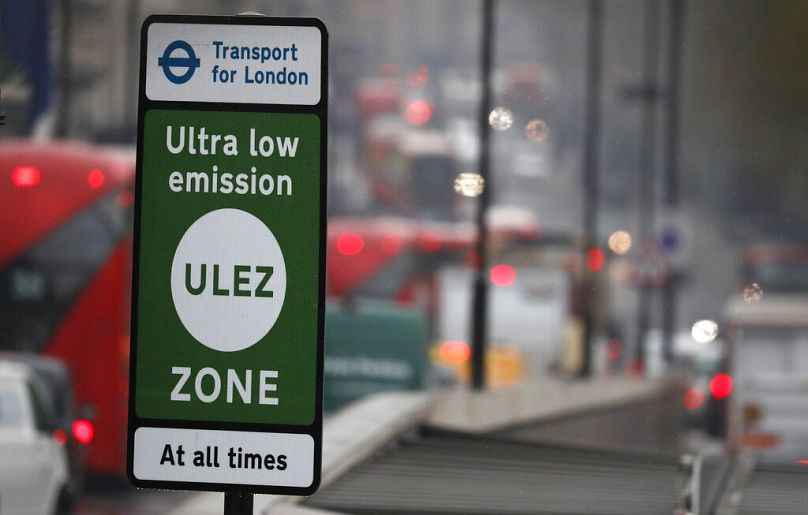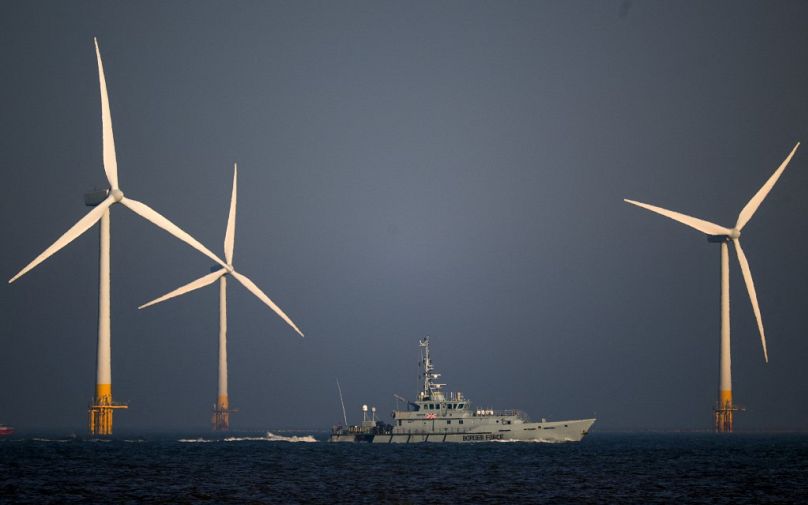New oil and gas licences have been described as “the final nail in the coffin for any suggestion that the UK is a climate leader.”
As the world faces widespread wildfires, heatwaves and extreme weather, the UK government is being criticised for rowing back key climate commitments.
The UK’s Climate Change Committee, the government’s independent climate advisor, has already warned that progress on reaching net zero is “worryingly slow” with the time to correct the path of progress “very short”.
Now many of the county’s climate policies - from transitioning to clean energy to air pollution reduction schemes - are being scrutinised following claims that they are unpopular and expensive.
Opposition politicians and other critics have accused the Conservative Party of stoking a “climate culture war” in an effort to upend the long-term consensus on climate change.
How did traffic control measures become a big political issue?
Expanding London’s Ultra Low Emissions Zone (ULEZ) became a political hot potato in the UK last week.
The air pollution reduction scheme requires older vehicles that don’t meet emissions standards to pay a £12.50 (€15) per day fee if they drive into it. It aims to reduce pollution and encourage the use of low-emissions vehicles in the city.
The government themselves have shown that the scheme has been effective since it was fully introduced in 2021. Air pollution dropped dramatically and there has been a significant reduction in the number of older, more polluting vehicles being driven in Greater London.
The ULEZ is due to become 18 times bigger in August 2023 but there have been legal battles and protests over its expansion. A coalition of London councils recently lost a UK High Court challenge that sought to stop it from going ahead.
Last week, a by-election in Boris Johnson’s former constituency of Uxbridge and South Ruislip became a de facto referendum on the scheme.
It seemed like a safe win for the Labour Party but there was upset following the winning Conservative party candidate’s decision to run on an anti-ULEZ platform. Tapping into local anger at the policy, it has been credited as the reason for their election success.
“I don’t think there is any doubt that ULEZ was the reason we lost the election in Uxbridge,” Labour leader Keir Starmer said on Saturday.
UK Prime Minister Rishi Sunak has now called for a review of low-traffic neighbourhoods or LTNs - another policy intended to reduce the number of vehicles passing through residential areas by blocking rat runs and encouraging walking or cycling.
This week he told UK newspaper the Sunday Telegraph that he was on the side of drivers, supporting people to “use their cars to do all the things that matter to them”.
‘Bolstering energy security’ or ‘the final nail in the coffin’?
The next in a series of controversial climate decisions saw the UK government approve more than 100 new North Sea oil and gas licenses on Monday (31 July). It stressed that the “thriving clean industry” could support up to 50,000 new jobs.
An analysis from the Business Council for Sustainable Development earlier this year estimates that the ambition needed to generate enough green energy to reach UK climate targets could create 279,000 jobs and support 654,000 more.
According to the Prime Minister, “bolstering energy security” is now more vital than ever following Putin’s invasion of Ukraine. He claimed that even when the country has reached net zero in 2050, a quarter of its energy needs will come from oil and gas.
“But there are those who would rather that it come from hostile states than from the supplies we have here at home,” the Prime Minister said.
New oilfields would supply at most around five years of demand if none was exported, according to analysis of government data by campaign group Uplift. It found that together, oil and gas fields in the North Sea would only be enough for an additional three weeks of energy a year.
“Scare tactics about Putin’s Russia won’t wash,” Dr Ashok Sinha, CEO of climate solutions charity Ashden says - describing the move as “wrong-headed and dangerous”.
He emphasises that increasing efficiency and accelerating renewables investment are the “best pathway” to energy independence.
“Today’s announcement is the final nail in the coffin for any suggestion that the UK is a climate leader,” Molly Scott Cato, former Green MEP and professor of economics at the University of Roehampton London, adds.
“Despite the UK hosting COP26 in Glasgow less than two years ago, the new gas and oil licensing is a clear signal to the EU and the world that the UK isn’t aligned with the leading democracies' view on the need to rapidly phase out fossil fuels.”
Cost of living, the climate crisis and the economy
Both the ‘rethink’ of air pollution schemes and the approval of new oil and gas licenses are being backed by a call from Conservative MPs to consider cost of living increases and the impact of green policies on people’s lives.
Sunak has suggested that net zero commitments should be “proportional and pragmatic” rather than adding cost or “hassle” to households. MP Sir Jacob Rees-Mogg has claimed that many are “unpopular” and “expensive”.
But, despite appealing to the concerns of many voters, critics aren’t convinced that this is actually the case.
Green Party co-leader Carla Denyer says the announcement is “nothing more than a cynical attempt to stoke division at the expense of both the climate and people across the country who are already struggling with rising living costs”.
Shadow climate secretary Ed Miliband has also criticised Sunak’s “weak and confused policy” for driving a “coach and horses through our climate commitments” leaving the UK “at the mercy of fossil fuel dictators”.
Miliband points out that a defacto ban on onshore wind farms could be adding up to £180 (€210) to energy bills while new oil and gas will “keep us reliant on dictators like Putin because they are sold on international markets”.
In an article for the Guardian last week, he said that the government was “lurching desperately towards a “culture war on climate” as it sought to “upend the climate consensus of the last 15 years”.
Others say that locking in fossil fuels for the foreseeable future makes little economic sense too.
“At a time when the US and EU are ramping up their investment in the green economy, creating new jobs and attracting inward investment, UK policy is going backwards,” says Dr Sinha.
He adds that this attitude is threatening the UK’s future economic competitiveness by creating jobs that will become redundant later on.
What about public opinion?
Another prong of the argument - fuelled in part by the Uxbridge and South Ruislip by-election success - focuses on how unpopular green policies supposedly are.
Polls, however, suggest that opinions on measures like the ULEZ, net-zero commitments and investment in energy are much more complicated.
Labour, Green and Liberal Democrat voters all back clean air zones, according to a recent poll by the campaign group More In Common. In the UK overall, 31 per cent of people supported ULEZ schemes while 39 per cent opposed them.
But in London, where they affect people the most, there was 39 per cent support and 35 per cent opposition.
While specific policy decisions are often deeply split down political lines, YouGov polls show that 65 per cent of Brits are worried about the climate crisis.
Generally, people are more likely to think that the government needs to do more - not less - to tackle climate change. Support for reaching net zero by 2050 is broad too across all ages and types of voters.













